This blog seeks to spotlight noteworthy UNESCO science and communications programs; it emphasizes links between the United States and UNESCO.
Tuesday, January 31, 2006
Americans for UNESCO Board Meeting
A meeting of the Board of Directors of Americans for UNESCO took place yesterday.
Andre Varchaver was elected to replace Dick Arndt as Chair. Arndt, after four years of arduous service, will move over to become Co-Chair of the Advisory Council.
The Treasurer reported that the recent fund raising campaign had proven reasonably successful, with donations received from the public as well as members of the Board and the Advisory Council. It was agreed that the organization would seek to account for in kind donations, which include large amounts of time donated to the organization's activity.
Progress on the renewal of the Americans for UNESCO website was reported. The UNESCO news blogs have received nearly 5,000 visits since December, 2004, and some 8,000 page views.
Andre Varchaver was elected to replace Dick Arndt as Chair. Arndt, after four years of arduous service, will move over to become Co-Chair of the Advisory Council.
The Treasurer reported that the recent fund raising campaign had proven reasonably successful, with donations received from the public as well as members of the Board and the Advisory Council. It was agreed that the organization would seek to account for in kind donations, which include large amounts of time donated to the organization's activity.
Progress on the renewal of the Americans for UNESCO website was reported. The UNESCO news blogs have received nearly 5,000 visits since December, 2004, and some 8,000 page views.
Fulbright Fellowship at UNESCO
The United Nations Foundation, a private organization, supports professional internships under the U.S. Fulbright program at UNESCO headquarters. I understand that there are currently nine Fellows in residence under the program, and that it is expected to appoint six more for the comming year.
The program is to allow selected grantees to contribute to the advancement of the work of the United Nations and UNESCO, learn from UNESCO staff, and gain valuable professional experience to cap off their Fulbright program abroad. While all degree levels are considered, recent graduates and master's degree applicants have been encouraged to apply.
INTERNSHIP AREAS: Include communications and the Media/Communications, Cultural & World Heritage, HIV/AIDS Education, Basic Education, Quality of Life Education, Sustainable Development and Global Tsunami Warning Systems. INTERNSHIP STIPEND: A travel and settling-in allowance and a monthly stipend to cover housing, meals, and incidental expenses will be provided.
The program is implemented by the International Institute for Education. This website provides information on the 2005 - 06 program.
The program is to allow selected grantees to contribute to the advancement of the work of the United Nations and UNESCO, learn from UNESCO staff, and gain valuable professional experience to cap off their Fulbright program abroad. While all degree levels are considered, recent graduates and master's degree applicants have been encouraged to apply.
INTERNSHIP AREAS: Include communications and the Media/Communications, Cultural & World Heritage, HIV/AIDS Education, Basic Education, Quality of Life Education, Sustainable Development and Global Tsunami Warning Systems. INTERNSHIP STIPEND: A travel and settling-in allowance and a monthly stipend to cover housing, meals, and incidental expenses will be provided.
The program is implemented by the International Institute for Education. This website provides information on the 2005 - 06 program.
Monday, January 30, 2006
Measuring Linguistic Diversity on the Internet

Read the report in English or French on its UNESCO website.
UNESCO has been emphasizing the concept of “knowledge societies”, which stresses plurality and diversity instead of a global uniformity in order to bridge the digital divide and to form an inclusive information society. An important theme of this concept is that of multilingualism for cultural diversity and participation for all the languages in cyberspace.
Findings from the 2005 UNESCO Science Report
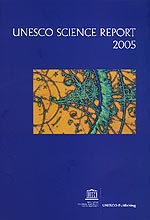
Asia 'leads Europe' in science spending
By Wagdy Sawahel, SciDev.Net, 23 January 2006.
China has played a major role in helping Asia overtake Europe in research and development spending, according to a report released last month (December 2005) by the UN Educational, Scientific and Cultural Organisation (UNESCO).The story is echoed in "China challenging US and Europe in scientific research" (China Educational and Research Network, 2006-01-23).
It says that from 1997 to 2002, Asian funding from public and private sources rose by four per cent, enabling Asia to account for 32 per cent of global research spending.
In those five years, China's share of global spending more than doubled, from four to nine per cent.
Meanwhile, the Latin America and the Caribbean region's share of the global total fell from 3.1 per cent to 2.6 per cent.
"Three countries — Brazil, Mexico and Argentina — account for 85 per cent of the region's [research spending], leaving the remainder with average expenditures of no more than 0.1 per cent of GDP — with the small but notable exception of Cuba, at 0.6 per cent," says the report.
Arab countries in the Middle East and North Africa contributed just 0.1 per cent of the global total.
Sunday, January 29, 2006
"The Net for Journalists: A practical guide to the Internet for journalists in developing countries"
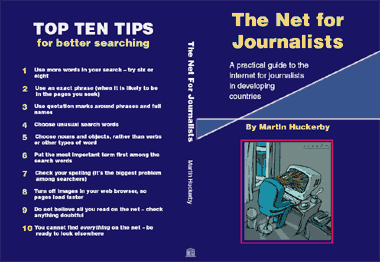
Go to the UNESCO announcement of the publication (with a link to download).
UNESCO collaborated with the Thomson Foundation and Commonwealth Broadcasting Association to produce a handbook for journalists of developing countries on the use of Internet for journalistic purposes.
This training handbook, which is written by a journalist and trainer Mr Martin Huckerby, is a resource (with a printed manual and a CD) designed for both print and broadcast journalists and journalism students in developing countries around the globe. The accompanying CD contains some software, other extra resources and lesson plans for trainers.
Friday, January 27, 2006
"African UNESCO' gets go-ahead"
Read the full atricle by Wagdy Sawahel in SciDev.Net. (27 January 2006)
"The African Union (AU) has backed plans to create a scientific and cultural branch modelled on the UN Educational, Scientific and Cultural Organization (UNESCO).
"The AU council gave the proposal, from Sudan, the green light at its summit last week (21 January) in the Sudanese capital Khartoum.
"Among its aims, the proposed African Educational, Scientific and Cultural Organization (AFESCO) intends to boost the continent's scientific capacity, promote international cooperation and protect African cultures."
"The African Union (AU) has backed plans to create a scientific and cultural branch modelled on the UN Educational, Scientific and Cultural Organization (UNESCO).
"The AU council gave the proposal, from Sudan, the green light at its summit last week (21 January) in the Sudanese capital Khartoum.
"Among its aims, the proposed African Educational, Scientific and Cultural Organization (AFESCO) intends to boost the continent's scientific capacity, promote international cooperation and protect African cultures."
Thursday, January 26, 2006
Thanks to Seabreeze Travel!
The folks at Seabreeze Travel have donated three desktop computers to Americans for UNESCO, filling a real need as we work to get the organization back online. Many thanks!
Wednesday, January 25, 2006
A window of opportunity for USAID
Read the full editorial by David Dickson in SciDev.Net. (24 January 2006.)
SciDev'Net's editor expresses cautious optimism that the newly announced reorganization of U.S. foreign assistance and the appointment of Randall Tobias as both Administrator of USAID and as tzar for development assistance (with rank equivalent to that of the Deputy Secretary of State) will lead to needed improvements in U.S. foreign assistance. He hopes that the improvements will include a strengthening of science and technology within U.S. foreign assistance, as do I.
I am especially hopeful since Tobias not only has been the CEO of major corporations, and thus can be expected to have great management skills and influence in this administration, but those corporations were in telecommunications and pharmaceuticals -- both with strong bases in science and technology and great relevance to the needs of developing nations. Moreover, Tobias left the corporate world to take on a major responsibility running the U.S. HIV/AIDS initiative, and through his foundation has financed important educational initiatives -- his heart seems to be in the right place!
In a related matter, I hear from Pat Koshel that the long-awaited National Academies of Science report on S&T in foreign assistance has just been approved for publication. She is hoping to the publication will be out soon!
Since the U.S. government has compartmentalized foreign assistance and relations with U.N. organizations, neither the reorganization nor the NAS report may be expected to have any direct impact on U.S. relations with UNESCO. However, if Dickson's hopes are fulfilled, and there is an improved climate for science and technology in the foreign assistance program of the United States, it seems very likely that there will be a corresponding increase in U.S. interest in UNESCO's science programs and an increased cooperation between efforts funded by U.S. foreign assistance and those funded by UNESCO.
A decision to reorganize the US Agency for International Development (USAID) - and to appoint the former head of a major pharmaceutical company as its new administrator - could boost the role of science and technology in the agency's efforts.
SciDev'Net's editor expresses cautious optimism that the newly announced reorganization of U.S. foreign assistance and the appointment of Randall Tobias as both Administrator of USAID and as tzar for development assistance (with rank equivalent to that of the Deputy Secretary of State) will lead to needed improvements in U.S. foreign assistance. He hopes that the improvements will include a strengthening of science and technology within U.S. foreign assistance, as do I.
I am especially hopeful since Tobias not only has been the CEO of major corporations, and thus can be expected to have great management skills and influence in this administration, but those corporations were in telecommunications and pharmaceuticals -- both with strong bases in science and technology and great relevance to the needs of developing nations. Moreover, Tobias left the corporate world to take on a major responsibility running the U.S. HIV/AIDS initiative, and through his foundation has financed important educational initiatives -- his heart seems to be in the right place!
In a related matter, I hear from Pat Koshel that the long-awaited National Academies of Science report on S&T in foreign assistance has just been approved for publication. She is hoping to the publication will be out soon!
Since the U.S. government has compartmentalized foreign assistance and relations with U.N. organizations, neither the reorganization nor the NAS report may be expected to have any direct impact on U.S. relations with UNESCO. However, if Dickson's hopes are fulfilled, and there is an improved climate for science and technology in the foreign assistance program of the United States, it seems very likely that there will be a corresponding increase in U.S. interest in UNESCO's science programs and an increased cooperation between efforts funded by U.S. foreign assistance and those funded by UNESCO.
Tuesday, January 24, 2006
Just Published: Connect- UNESCO International Science, Technology and Environmental Education newsletter

Read the new edition online.
The most recent edition of ‘Connect’ focuses on the issue of scientism, a belief that scientific knowledge is the foundation of all wisdom. In this focus article, ‘scientism’ is a word that is used to criticise those who think that sciences are more important than the arts for understanding the world. The authors ask whether ‘scientism’ hurts science education, and, more generally, educational systems.
The newsletter contains additional articles about UNESCCO’s regional activities in Science , Technology and Environmental Education as well as a reviews of recent publications in the field.
Tuesday, January 17, 2006
UNESCO, big business join forces against AIDS
Read the full article in AFP via Yahoo!News.
UNESCO and The Global Business Coalition (GBC) on HIV/AIDS signed the agreement on Monday, January 15. The Global Business Alliance invludes 200 companies that have committed themselves to fighting AIDS. Many of the coalition's members, including DaimlerChrysler, GlaxoSmithKline, Total, L'Oreal, Volkswagen, Johnson and Johnson, and Unilever have already implemented anti-AIDS strategies, mostly in Africa. UNESCO Director-General Koichiro Matsuura stressed the need for cooperation between institutions and the private sector to fight the "scourge" of HIV/AIDS.
UNESCO and The Global Business Coalition (GBC) on HIV/AIDS signed the agreement on Monday, January 15. The Global Business Alliance invludes 200 companies that have committed themselves to fighting AIDS. Many of the coalition's members, including DaimlerChrysler, GlaxoSmithKline, Total, L'Oreal, Volkswagen, Johnson and Johnson, and Unilever have already implemented anti-AIDS strategies, mostly in Africa. UNESCO Director-General Koichiro Matsuura stressed the need for cooperation between institutions and the private sector to fight the "scourge" of HIV/AIDS.
Thursday, January 12, 2006
Jane Goodall to receive UNESCO’s 60th anniversary medal
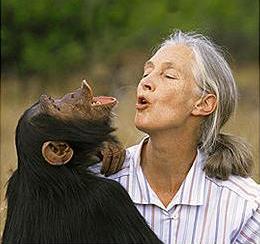
Read the full UNESCO press release.
The Director-General of UNESCO, Koïchiro Matsuura, will award UNESCO’s 60th Anniversary Medal to Jane Goodall, the British-born primatologist, on Tuesday 17 January, at the Organization’s Headquarters in Paris (11.15 a.m., Restaurant 7th floor). The medal is presented in recognition of Ms Goodall’s lifelong dedication to the preservation of Africa’s endangered apes. “Ms Goodall’s untiring work to preserve the great apes of Africa in their natural environment fits perfectly with UNESCO’s work in favour of the environment and of sustainable development,” Mr Matsuura said. “Ms Goodall was one of the first people to sound the alarm regarding the serious danger facing the great apes, that provide us with a direct link to humanity’s past.”
Ms Goodall has been a researcher and champion of chimpanzees and other primates since she first arrived in Africa in 1960 at the age of 26. Only 400,000 great apes survive today, compared to two million 50 years ago and experts predict their extinction within three to five decades, unless present trends are reversed.
Sustainable Management of Marginal Drylands (SUMAMAD( Project
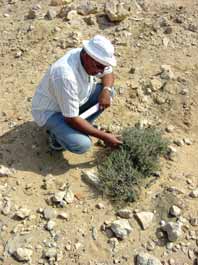
Go to the project website.
SUMAMAD aims at enhancing the sustainable management and conservation of marginal drylands in northern Africa and Asia. Drylands are particularly vulnerable due to climatic and human pressures, yet they constitute some of the world's largest land reserves in terms of space and natural resources. Their increased productivity, which is needed to meet the demands of exponential population growth, needs however to be embedded in wise practices that both respect the conservation of the environment, and provide improved and alternative livelihoods for dryland populations. The project is to identify management approaches that promote economic sustainability and resource conservation, in particular of soils and water, and it to foster the rehabilitation of degraded drylands using community-based approaches. It is to work in selected study sites in the countries involved to compare results and share knowledge. Socio-economic surveys are to identify people's adaptation and traditional knowledge in coping with adverse dryland conditions. Training, capacity building and interaction with landowners, farmers and other stakeholders, with a focus on sustainable and indigenous dryland management practices, are to be key elements of the project.
The SUMAMAD project is funded by the Flemish Government of Belgium. It is implemented by UNESCO-MAB in close collaboration with UNU and ICARDA.
A project workshop kicks off the International Year of Deserts and Desertification later this month. Between 26 January and 1 February, the workshop will review an ongoing project for the sustainable management of marginal drylands (SUMAMAD) in northern Africa, Asia and the Middle East. Organized in Islamabad by the Pakistan Council of Research in Water Resources in collaboration with UNESCO, the United Nations University and the International Centre for Agricultural Research in Dry Areas, the workshop will provide practical training in data analysis and examine progress since the project began in 2004 in protecting both the biological diversity of deserts and the traditional knowledge of communities affected by desertification. The project is expected to run until 2008, with funding from the Flemish Government of Belgium.
Monday, January 09, 2006
Whither UNESCO? Science, Poverty, and Peace
There has been a change in the speaker lineup for this symposium on UNESCO to be held as part of the AAAS Annual Meeting in St. Louis. The correct information follows:
DATE: Friday, February 17, 2006
TIME: 8:30 AM - 10:00 AM
ORGANIZER: Irving Lerch, Americans for UNESCO
PARTICIPANTS:
Laurel Baldwin-Ragaven (Moderator), Trinity College
Marcio Barbosa* (Speaker), United Nations Educational, Scientific, and Cultural Organization (UNESCO), Paris
The View from UNESCO
Walter Erdelen* (Speaker), UNESCO
The Impact of the UNESCO Science Program
Marguerite Sullivan (Speaker), U.S. Department of State
The View from the U.S. Government
Bruce Alberts (Speaker), University of California, San Francisco
The Role and Viewpoint of the National Academies
Rita Colwell (Speaker), University of Maryland and Canon U.S. Life Sciences Inc.
The Role and Expectation of the Learned and Professional Societies
Laurel Baldwin-Ragaven is the Henry R. Luce Professor of Health and Human Rights in Trinity College, and current Chair of the AAAS Committee on Scientific Freedom and Responsibility.
* Please note that UNESCO Deputy Director General Barbosa and UNESCO Assistant Director General Erdelen are listed as unconfirmed speakers. This is due to the fact that hard commitments cannot be made long before the event. However, the organizers have been assured of their desire to attend and participate in this discussion.
DATE: Friday, February 17, 2006
TIME: 8:30 AM - 10:00 AM
ORGANIZER: Irving Lerch, Americans for UNESCO
PARTICIPANTS:
Laurel Baldwin-Ragaven (Moderator), Trinity College
Marcio Barbosa* (Speaker), United Nations Educational, Scientific, and Cultural Organization (UNESCO), Paris
The View from UNESCO
Walter Erdelen* (Speaker), UNESCO
The Impact of the UNESCO Science Program
Marguerite Sullivan (Speaker), U.S. Department of State
The View from the U.S. Government
Bruce Alberts (Speaker), University of California, San Francisco
The Role and Viewpoint of the National Academies
Rita Colwell (Speaker), University of Maryland and Canon U.S. Life Sciences Inc.
The Role and Expectation of the Learned and Professional Societies
Laurel Baldwin-Ragaven is the Henry R. Luce Professor of Health and Human Rights in Trinity College, and current Chair of the AAAS Committee on Scientific Freedom and Responsibility.
* Please note that UNESCO Deputy Director General Barbosa and UNESCO Assistant Director General Erdelen are listed as unconfirmed speakers. This is due to the fact that hard commitments cannot be made long before the event. However, the organizers have been assured of their desire to attend and participate in this discussion.
An Indian Diaspora Knowledge Network
Read the article by George Iype at Rediff.com. (January 07, 2006)
UNESCO operates a project promoting Diaspora Knowledge Networks. The ambition of the project is "to build an infrastructure that can be used by members of scientific and technical diaspora for transforming the information that is available to them in their countries of adoption into useful knowledge for the development of their countries of origin. Placing the emphasis on transforming information into useful knowledge for collective action recognises the need to computer support the cognitive and social processes underlying this transformation."
Abdul Waheed Khan, Assistant Director-General (Communication and Information), UNESCO, has commented (as quoted by Rediff.com):
India on Saturday announced that it will set up a Diaspora Knowledge Network to enable improved connectivity between People of Indian Origin and to allow the large number of overseas Indians to partake in India's growing 'knowledge economy'.
The Diaspora Knowledge Network was a slew of major initiatives that Prime Minister Manmohan Singh announced to ensure that millions of overseas Indian workers and professionals become symbols of global connectivity and globalised activity in order to capture the face of a new India.
Addressing the conclave of overseas Indians in Hyderabad during the 3rd Pravasi Bharatiya Divas, Dr Singh said the Diaspora Knowledge Network will provide a dynamic framework within which the users and providers of knowledge can discover each other and work together.
The knowledge resources of overseas Indians and its significance in the context of India's march to becoming a developed economy and society are well known. The principles of knowledge societies are freedom of expression, universal access to information and knowledge and respect for culture. A key opportunity for India is to find ways and means to leverage the knowledge, expertise and skills of Indians abroad. Today's world is enabled by information and communication technologies; and it offers the opportunity to tap India's Diaspora knowledge resources through the Diaspora Knowledge Network.
UNESCO operates a project promoting Diaspora Knowledge Networks. The ambition of the project is "to build an infrastructure that can be used by members of scientific and technical diaspora for transforming the information that is available to them in their countries of adoption into useful knowledge for the development of their countries of origin. Placing the emphasis on transforming information into useful knowledge for collective action recognises the need to computer support the cognitive and social processes underlying this transformation."
Multilingualism on the Internet

Go to the website for the issue.
This is a special issue of the International Journal on Multicultural Societies published by UNESCO. (Vol. 6, No. 1, February 2004) It reports on research undertaken in the framework of UNESCO’s multidisciplinary project Initiative B@bel. The article included are:
"Globalization, Transnational Communication and the Internet" by David Block;
"An Analysis of the Language Repertoires of Students in Higher Education and their Language Choices on the Internet" (Ukraine, Poland, Macedonia, Italy, France, Tanzania, Oman and Indonesia) by Helen Kelly Holmes;
"From the Oral Tradition to the Information Era: the Case of Tanzania" by Safari Mafu;
"The Internet in Arabic-speaking Settings: a Case Study" by Richard Peel;
"Japanese Speakers and the Internet" by Helen Gerrard and Sachiko Nakamura.
There is a related Editorial by Matthias Koenig amd a "Thematic Introduction" by Sue Wright.
Sunday, January 08, 2006
Traditional Knowledge, Genetic Resources and Folklore
Working in co-operation with UNESCO and other international organizations, and in dialogue with NGOs, The World Intellectual Property Organization (WIPO) provides a forum for international policy debate concerning the interplay between intellectual property (IP) and traditional knowledge, genetic resources, and traditional cultural expressions. WIPO is developing draft legal mechanisms and a range of practical tools aimed at enhancing the intellectual property interests of the holders of such knowledge, resources and expressions.
Robinson Miller Upton: 1916-2005

Read the obituary in The Chicago Tribune.
Miller Upton, who served for 21 years as president of Beloit College, died December 19, 2005, at his home in Fontana, Wis. He was 88. Mr. Upton was president of many organizations, including the Council of Protestant Colleges and Universities, the Wisconsin Association of Independent Colleges and Universities, the Wisconsin Association on Higher Education and the American Finance Association. Mr. Upton also served on the board of directors for various companies, including what is now M&I Bank in Beloit, Snap-On Tools Corp., American General Series Portfolio Co., Affiliate Artists Inc., Sears Roebuck Foundation and Household International Inc.
Mr. Upton had a passion for working with international organizations on how to advance education. He was chairman of the U.S. National Commission for UNESCO from 1971 to 1974.
Emily Vargas-Baron provided the following comments on Miller Upton:
He and his wife June have been dear friends. I first met him when, as the director of the U. S. National Commission to UNESCO, he gave a marvelous speech at a General Conference. He received a standing ovation, and at first he did not realize how unusual this was...
Miller was a dynamic, gentle and highly effective leader. He fully supported Jack Fobes, and for years contributed in many ways to AAU. I am glad he lived to see the United States return to UNESCO.
Through the U.S. National Commission, he helped ensure the broad participation of civil society in UNESCO and its programmes. As President of Beloit College, he orchestrated the provision of an excellent liberal arts programme. Both activities were a reflection of his deep commitment to ideals of peace, democracy, the rule of law, and education for all. I am sure many of you will join me in missing Miller greatly.
For your information, Beloit College has established the Miller and June Upton Scholarship Fund.
Wednesday, January 04, 2006
The Precautionary Principle
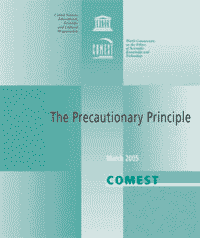
Report of UNESCO's expert group on the Precautionary Principle, adopted by the World Commission on the Ethics of Scientific Knowledge and Technology (COMEST) at its fourth session (March 2005). Available in English and French.
Members of the expert group from the United States were:
VITTORIO HOSLE
Professor of German, Philosophy, Political Science
University of Notre Dame
ANN KINZIG
Assistant Professor
School of Life Sciences
Arizona State University
Why the United States Rejoined UNESCO
Read the full Fact Sheet on the website of the U.S. Embassy in Paris.
“As a symbol of our commitment to human dignity, the United States will return to UNESCO. This organization has been reformed and America will participate fully in its mission to advance human rights and tolerance and learning.”
George W. Bush
57th UN General Assembly, September 12, 2002
Why the United States is Rejoining UNESCO
“Since wars begin in the minds of men, it is in the minds of men that the defenses of peace must be constructed.”
American poet Archibald MacLeish
Preamble of the UNESCO Constitution
“As a symbol of our commitment to human dignity, the United States will return to UNESCO. This organization has been reformed and America will participate fully in its mission to advance human rights and tolerance and learning.”
George W. Bush
57th UN General Assembly, September 12, 2002
Why the United States is Rejoining UNESCO
• UNESCO’s mission and programming reflect and advance a wide range of U.S. interests. For example, UNESCO manages the “Education for All” program, which promotes universal basic education and literacy. This initiative advances U.S. educational goals worldwide and closely parallels the U.S. “No Child Left Behind” program.
• UNESCO advocates education that promotes tolerance and civic responsibility. This is a key to building democracy and combating terrorism.
• UNESCO helps countries protect their natural and cultural heritage. It promotes adoption of sound scientific standards. These efforts are important in maintaining a healthy balance between continuity and imperatives for change.
• UNESCO promotes press freedom and independent media, essential foundations of democracy.
• UNESCO brings countries together to address issues that have significant implications for the future, such as bioethics and cultural diversity. The United States intends to be a full and active participant in these deliberations.
“Since wars begin in the minds of men, it is in the minds of men that the defenses of peace must be constructed.”
American poet Archibald MacLeish
Preamble of the UNESCO Constitution
Tuesday, January 03, 2006
ICT Enhanced Public Service Broadcasting
UNESCO photo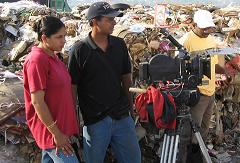
Go to UNESCO's website for this initiative.
This UNESCO program, launched in 2004, is designed to enhance the ability of public service broadcasters (PSBs) in developing countries to create communication/media materials supportive of human rights, peace, tolerance, and the fight against discrimination. The programme involves inviting production proposals from television and film professionals for a series of grants, in addition to providing training, production and distribution opportunities that draw on information and communication technologies (ICTs).
According to UNESCO, "Public service broadcasting entails independence from state and commercial influences, while having the ability to examine important public issues by providing programmes that include public debate, cultural expressions and educational programming aside from light entertainment. It is also indispensible that public service broadcasting systems adapt to the rapidly-evolving information society, particularly in the integration of audiovisual, communication and information technologies."
Read the review of the program from the Communications Initiative.

Go to UNESCO's website for this initiative.
This UNESCO program, launched in 2004, is designed to enhance the ability of public service broadcasters (PSBs) in developing countries to create communication/media materials supportive of human rights, peace, tolerance, and the fight against discrimination. The programme involves inviting production proposals from television and film professionals for a series of grants, in addition to providing training, production and distribution opportunities that draw on information and communication technologies (ICTs).
According to UNESCO, "Public service broadcasting entails independence from state and commercial influences, while having the ability to examine important public issues by providing programmes that include public debate, cultural expressions and educational programming aside from light entertainment. It is also indispensible that public service broadcasting systems adapt to the rapidly-evolving information society, particularly in the integration of audiovisual, communication and information technologies."
Read the review of the program from the Communications Initiative.
Monday, January 02, 2006
Whither UNESCO? Science, Poverty, and Peace
Go to the meeting website.
DATE: Friday, February 17, 2006
TIME: 8:30 AM - 10:00 AM
LOCATION: St. Louis, Missouri
ORGANIZER: Irving Lerch, Americans for UNESCO
This meeting will be held as part of the American Association for the Advancement of Science (AAAS) Annual Meeting in St. Louis, Missouri
SYNOPSIS:
This is a critical time for UNESCO. The basic science and engineering program is being reorganized, increasingly complex issues in biomedicine are being scrutinized, and the member states are ordering their priorities placing greater emphasis on the devolution of programs away from the center and onto offices in geographically dispersed regions. U.S. State Department officials are trying to find ways to coordinate the participation of civil society with the work of the U.S. National Commission for UNESCO. The organization is being asked to place greater weight on science and engineering in the service of UNESCO's cross-cutting goals: poverty, conflict reduction, and social justice. The framework for these great works is being redeveloped to achieve greater efficiencies with a view to obtaining lasting and substantial results. UNESCO institutes, such as the Abdus Salam International Center for Theoretical Physics, have become important resources for the global science and engineering enterprise to recruit and develop scholars from developing countries and integrate them into the intellectual life of the global science and engineering community. The purpose of this symposium is to track these changes and to determine how best to organize U.S. participation to achieve global and national objectives.
DATE: Friday, February 17, 2006
TIME: 8:30 AM - 10:00 AM
LOCATION: St. Louis, Missouri
ORGANIZER: Irving Lerch, Americans for UNESCO
This meeting will be held as part of the American Association for the Advancement of Science (AAAS) Annual Meeting in St. Louis, Missouri
SYNOPSIS:
This is a critical time for UNESCO. The basic science and engineering program is being reorganized, increasingly complex issues in biomedicine are being scrutinized, and the member states are ordering their priorities placing greater emphasis on the devolution of programs away from the center and onto offices in geographically dispersed regions. U.S. State Department officials are trying to find ways to coordinate the participation of civil society with the work of the U.S. National Commission for UNESCO. The organization is being asked to place greater weight on science and engineering in the service of UNESCO's cross-cutting goals: poverty, conflict reduction, and social justice. The framework for these great works is being redeveloped to achieve greater efficiencies with a view to obtaining lasting and substantial results. UNESCO institutes, such as the Abdus Salam International Center for Theoretical Physics, have become important resources for the global science and engineering enterprise to recruit and develop scholars from developing countries and integrate them into the intellectual life of the global science and engineering community. The purpose of this symposium is to track these changes and to determine how best to organize U.S. participation to achieve global and national objectives.
Small Islands Voice
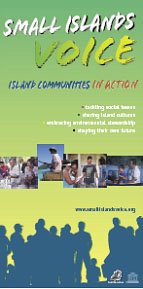
Go to the Small Islands Voice website.
Small Islands Voice is an inter-regional initiative focusing on small islands - both small island developing states, and islands with other affiliations - in the Caribbean, Indian Ocean and Pacific regions. The goal of this initiative is to make the general public in small islands more clearly heard, and to strengthen the public's influence in island development.
Small Islands Voice works with villages, specific interest groups, and sometimes entire islands, by building capacity so that islanders can more effectively plan and implement their own vision of sustainable development. Exchanging experiences inter-regionally through the program is intended to further strengthen a sense of community amongst islands.
It is an initiative within UNESCO's program on the Environment and development in coastal regions and in small islands.
Subscribe to:
Posts (Atom)